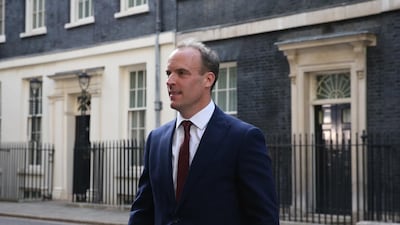The new UK foreign secretary charged with leading the diplomatic response to the Gulf tanker crisis has previously warned of Britain’s limited ability to resolve disputes in the Middle East.
Dominic Raab was appointed as Britain’s chief diplomat by new prime minister Boris Johnson on Wednesday who has promised a new “golden age” for British influence and prosperity in his first address to MPs.
In a series of articles for newspapers before his rise to the cabinet in 2018, Mr Raab expressed scepticism about the prospects of significant UK intervention in the Middle East in the wake of the 2003 invasion of Iraq.
In 2013, citing US unwillingness for new military intervention during the presidency of Barack Obama, Mr Raab wrote that there was little that the UK could do to prevent chaos in Syria.
"For all our disgust at Assad's brutality, the real test for Britain is to reconcile ourselves to a more modest role," he wrote in The Sunday Times in 2013.
Mr Raab, a former lawyer at the department he now heads, said that the UK should respond to instability in the Middle East by building its energy independence and using its military for selective UN peacekeeping operations.
During a parliamentary debate in 2014 on airstrikes targeting ISIS in Iraq, Mr Raab told MPs that he was backing the move but “I do retain serious strategic and practical reservations about Britain, yet again, seemingly dipping her toe into the crucible of the Middle East”.
Mr Raab in 2013 also called for the return to power of the Muslim Brotherhood’s elected president, Mohamed Morsi, after his overthrow by the military as he represented the least worst option for Egypt.
“Our ambition for the region should not be the naive dream of recreating Swiss democracy from the fertile crescent to the Arabian desert,” he wrote.
The change in UK leadership means that the diplomatic crisis in the Gulf will be handled by a newly installed premier, foreign secretary and defence secretary, after the sacking of the first woman to hold that post.
The UK said on Wednesday that a British warship would accompany all British-flagged vessels through the Strait of Hormuz. The move signalled a change in policy after Mr Raab’s predecessor said that it was not possible to provide escorts for every ship. Mr Johnson has promised to spend more on the Royal Navy.
The new defence secretary, Ben Wallace, a former British army veteran, was previously a security minister at a time when the UK was hit by a series of terrorist attacks in 2017. Mr Wallace was a former joint chairman of the all-party group of MPs that visited Tehran in 2014.
He said that as an MP, he had visited Iran more than any other British parliamentarian. In a statement posted on his website stating his reasons for backing an extension of military action against ISIS from Iraq to Syria, he wrote: “I am often accused by some of being too pro-Iran, as it is my view that any solution to Syria and Afghanistan needs to include Iran.”
The two men are joined by Priti Patel as newly promoted MPs to the most important positions with responsibility for security within the UK government.
Ms Patel, who was named as home secretary with responsibility for policing and immigration, was forced to resign from the cabinet two years ago.
While international development secretary, she organised unofficial meetings with prime minister Benjamin Netanyahu and other officials while supposedly on holiday in Israel. She had broken protocol by failing to tell Downing Street in advance.

